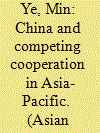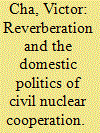| Srl | Item |
| 1 |
ID:
142783


|
|
|
|
|
| Summary/Abstract |
A big question looming large over policy and theory in Asian security is how China will use its newfound wealth and power in the region and with what consequences. The United States has concluded the negotiation of Trans-Pacific Partnership (TPP); ASEAN has promoted the Regional Comprehensive Economic Partnership (RCEP). Both frameworks seek to shape China’s regional behavior and manage rising China. In late 2013, China inaugurated the new Silk Road initiative, which has rapidly gained momentum in the country and among China’s neighbors. American public and policy makers, however, are largely unaware or baffled by the new Silk Road. The article, based on field surveys and extensive documentary analysis, provides the first roadmap on how China views TPP, RCEP, and the new Silk Road. It offers important exploration of how China acts and reacts to regional contestation and what are implications for the region.
|
|
|
|
|
|
|
|
|
|
|
|
|
|
|
|
| 2 |
ID:
142782


|
|
|
|
|
| Summary/Abstract |
This study examines the evolution of civilian control in Cambodia and its impact upon that country’s security sector reform efforts. It argues that Cambodia has witnessed a historically entrenched path dependence of civil-military relations, whereby ruling personalities and parties have consecutively dominated subservient, authoritarian militaries. Today security forces appear as a partisan, corporate arm of the Cambodian People’s Party (CPP). While this has ensured civilian control, it is not an institutionalized form of control. Instead Prime Minister Hun Sen has personalized supremacy over security forces through what might be termed “neo-sultanistic tendencies.” Yet how have Cambodia’s civil-military relations evolved? What is the current state of civilian control and security sector reform efforts? What is the future of civil-military relations? This analysis addresses these questions.
|
|
|
|
|
|
|
|
|
|
|
|
|
|
|
|
| 3 |
ID:
142784


|
|
|
|
|
| Summary/Abstract |
Discontent over US military bases in Japan’s Okinawa prefecture has long been a prominent “thorn in the side” of US–Japan relations. But what exactly has been the effect of Okinawa’s base politics on the management of the alliance? We examine Okinawa’s significance on the US–Japan alliance—the “Okinawa effect”—in terms of the alliance’s strategic coherence. Through an examination of the post–Cold War history of the base issue, we argue that, while there little to suggest that the Okinawa issue has undermined the alliance’s strategic effectiveness, alliance efficiency in dealing with burden sharing problems has been diminished, at times substantially. While reduced efficiency may often be inevitable in alliances between democracies, this persistent inability to resolve burden sharing disputes in the Okinawan case means that there is still potential for deteriorating efficiency to eventually undermine the alliance’s solidarity and effectiveness.
|
|
|
|
|
|
|
|
|
|
|
|
|
|
|
|
| 4 |
ID:
142785


|
|
|
|
|
| Summary/Abstract |
Reverberation refers to the role that external domestic and international variables can play in shaping the win-set of a negotiation between two countries. These variables create political considerations, political mandates, and political constraint outside of the technical discussion that influence the negotiation. This article looks at the degree to which political variables “reverberated’ onto the 2015 civil nuclear agreement between the United States and the Republic of Korea (ROK), the end product of a four-and-a-half-year negotiation specifying the terms under which the ROK could use US-supplied technology and materials to pursue sovereign nuclear power generation and nuclear energy provision to third countries. It will argue that while the potential was high for this technical negotiation to become politicized in a domestic context in South Korea and potentially erode alliance relations, the two countries managed to keep the disagreements in the experts’ space, without negative reverberating effects on political leaders.
|
|
|
|
|
|
|
|
|
|
|
|
|
|
|
|